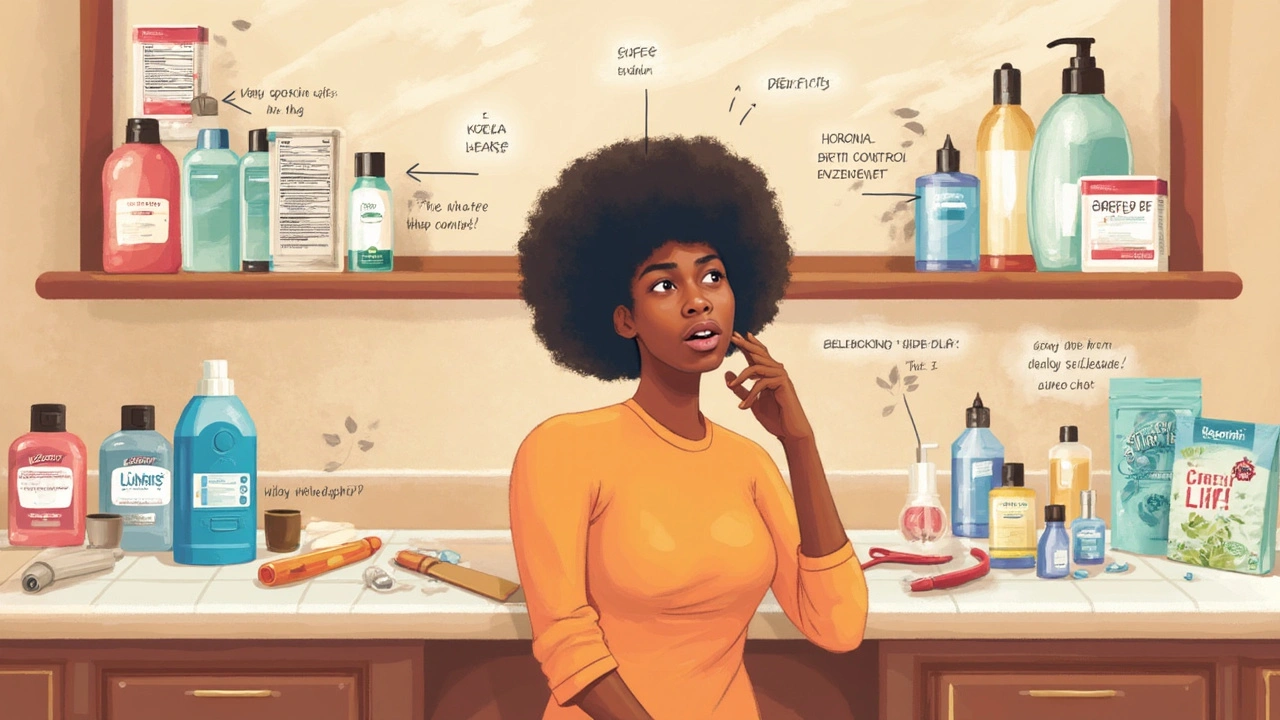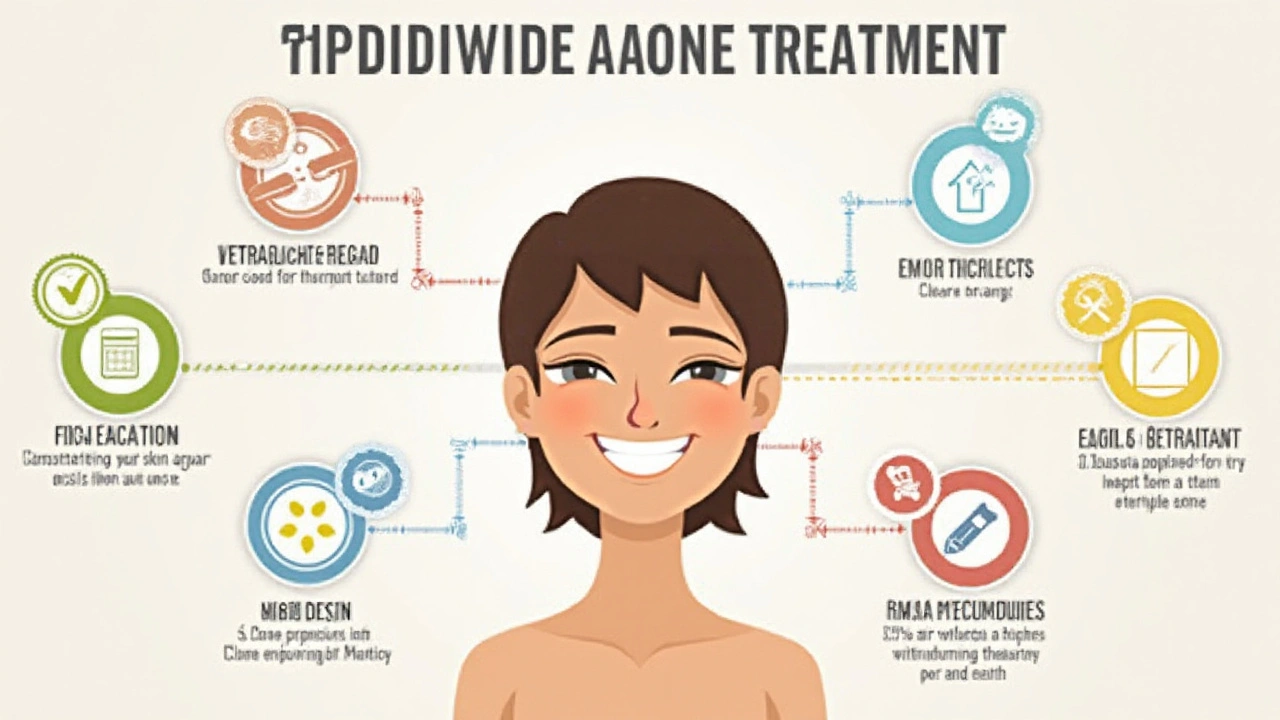So, you're faced with the battle against acne, and Isotroin might not be your pick? Or maybe you're just exploring other options. Let's delve into viable alternatives. Addressing pesky breakouts doesn't have to mean sticking to the old school. We're in 2025, and skincare's evolved big time.
One noteworthy option is hormonal birth control. It's not just for contraception anymore. For many women, this can be a double win: fewer pimples and contraception advantage. Hormonal imbalances often fuel acne, so regulating the hormones can help to reduce breakouts.
Pros
- Regulates menstrual cycles
- Decreases cystic acne
- Offers contraception
Cons
- Possible mood swings
- Needs medical supervision
- Not suitable for everyone
- Hormonal Birth Control
- Diet and Lifestyle Changes
- Topical Retinoids
- Laser Treatments
- Natural Supplements
- Salicylic Acid
- Benzoyl Peroxide
- Blue Light Therapy
- Chemical Peels
- Tea Tree Oil
- Conclusion
Hormonal Birth Control
Are you looking to say goodbye to those dreaded acne breakouts while ticking off contraception needs too? Hormonal birth control could be your multitasking superhero. This isn’t just about family planning anymore; it's also a solution for tackling pesky skin issues.
Here's how it works: hormonal contraceptives adjust your hormone levels, particularly reducing androgens. Androgens contribute heavily to acne by increasing oil production in the skin, so keeping them in check helps in reducing acne.
According to dermatologists, this treatment shows positive results for many women struggling with hormonal acne, especially if you’re facing cystic types.
Pros
- Regulates menstrual cycles, keeping everything on track
- May help in reducing occurrences of cystic acne, which we know can be quite stubborn
- Offers the benefit of contraception, two birds with one stone!
Cons
- Just like anything, it’s not for everyone. It requires prescription and careful monitoring by your healthcare provider.
- Potential mood swings, which might be a deal-breaker for some
- Specific conditions make it unsuitable for some women, like those with a history of blood clots, so it’s crucial to have a chat with your doc first.
Oh, and just a quick heads-up: not all insurance plans might cover hormonal birth control when used primarily for acne treatment. Be sure to check your benefits to avoid surprise bills.
Diet and Lifestyle Changes
Alright, let's talk about how changing up what you eat and how you live can impact your acne treatment. Sometimes, it's not just about the products you slather on your face; it's also about what goes into your body. A healthier diet can often mean healthier skin.
Cutting down on sugar and processed foods can be a game-changer. These foods can spike your blood sugar and lead to increased oil production, which in turn clogs up your pores. Instead, try eating more fruits, veggies, whole grains, and lean proteins. Omega-3 fatty acids—like the kind you find in fish and flaxseeds—are famous for reducing inflammation, which can help calm down acne.
And it's not just about what you eat; how you move matters too. Regular exercise boosts circulation, helping to nourish your skin and carry away waste products. Plus, it helps balance hormones, which is super important since hormone imbalance can often lead to breakouts.
- Stress Reduction: Find ways to chill out, whether through yoga, meditation, or just taking a walk. Stress hormones can also trigger acne.
- Stay Hydrated: Drinking enough water can help keep your skin hydrated and flush out toxins.
- Sleep Well: A good night's sleep can help skin repair itself and prevent excess oil production.
If you're all about data, here's a little insight. Some studies have shown that individuals who reduced their sugar intake saw a visible improvement in their acne severity. That’s something to think about when reaching for that extra cookie.
Topical Retinoids
Alright, if you're looking into alternatives to Isotroin, topical retinoids might be on your radar. These vitamin A derivatives have been a go-to for acne treatment for a good reason. They work by unplugging the hair follicles and getting rid of dead skin cells, making them a solid choice for tackling blackheads and whiteheads.
Let me break it down for you. When you apply topical retinoids, expect a process called 'cell turnover' to speed up. This essentially means that your skin sheds its old and damaged cells faster, making way for new, healthier skin. It doesn’t just stop there; retinoids can also help with wrinkles and improve skin texture. It's like hitting two birds with one stone.
Now, keep in mind, patience is key. Although some folks see improvements in their acne within a few weeks, it often takes about three months for a noticeable change. Meanwhile, during the first few weeks of treatment, it’s common to experience some skin dryness and even an increase in breakouts as your skin adjusts.
Pros
- Treats blackheads, whiteheads, and more persistent forms of acne
- Improves skin texture and reduces wrinkles
- Promotes faster shedding of old skin cells
Cons
- Potential initial irritation, dryness, and peeling
- Sun sensitivity requiring diligent use of sunscreen
- Regular application needed for best results
Just don’t forget! Always apply them at night because they can make your skin more sensitive to sunlight. Pair them with a good sunscreen during the day to keep your skin protected. If you've got sensitive skin, start slow to see how your skin reacts. You're paving the way to clearer skin, so give it time and consistency.
Laser Treatments
Laser treatments have gained popularity as an effective alternative to Isotroin for those battling stubborn acne. Think of them as little wavelength warriors, working to zap away the root causes of those annoying pimples. By targeting the deeper layers of the skin, lasers can reduce oil glands and kill acne-causing bacteria. Plus, these treatments boost collagen production, helping minimize scarring and making your skin look smoother.
There are a few different types of lasers, but the most common ones used for acne are blue light, red light, and infrared lasers. Each of them has its superpowers. For example, blue light targets and destroys the bacteria responsible for acne, while infra-red can reach deeper into the skin to deal with inflammation and oil production.
Pros
- Targets bacteria and inflammation directly
- Reduces oil production
- Improves skin texture by boosting collagen
Cons
- Can be expensive
- Multiple sessions may be required for the best results
- Some redness and swelling post-treatment
In terms of the numbers, folks usually see about a 50% reduction in acne after a series of treatments. I've heard from a friend who swears by this method, though it took her about six sessions to really notice the changes. While costs can add up, many people find it worth the investment, especially if traditional methods haven't worked for them.
So, if you're considering saying adios to conventional methods and investing a bit more in your skin, laser treatments might just be worth exploring.
Natural Supplements
Feeling overwhelmed by the vast selection of acne treatments? You're not alone. The allure of natural supplements is growing, especially for folks eyeing alternatives to Isotroin. These supplements aim to promote healthy skin from the inside out, without the strong chemicals often found in traditional acne meds.
Let's talk zinc for a second. Known for its anti-inflammatory properties, zinc can help reduce redness and swelling linked to acne. Some studies suggest that zinc deficiency could be a culprit in acne flare-ups. Omega-3 fatty acids also make the list. Found in fish oil, they battle inflammation, potentially reducing breakouts. Curious how they stack up against other treatments? Here's a handy comparison table:
| Supplement | Benefit |
|---|---|
| Zinc | Reduces inflammation, balances hormones |
| Omega-3 | Decreases redness, improves skin barrier |
And hey, stress-busting is another great sidekick. Many natural supplements, like adaptogens, help manage stress, which can otherwise make acne worse. As Dr. Sarah Lee, a leading dermatologist, says,
"Balancing stress levels with natural supplements can be transformative for skin health."Remember, before starting any new supplement, it's a wise move to chat with a healthcare pro. Ensuring the supplement won’t mess with other meds or conditions is key. Exploring natural routes can feel empowering—just make sure it's also safe.

Salicylic Acid
If you've been wandering the skincare aisles or diving into TikTok skincare routines, you've probably heard of salicylic acid. It's a staple in the world of acne treatment, and for good reason. This beta hydroxy acid (BHA) is all about deep cleaning those pores and shedding dead skin cells, making it a perfect team player in the battle against spots.
Salicylic acid works like a mini exfoliant, breaking down what's clogging your pores—like dirt, oil, and dead skin. It's especially effective for acne treatment because it dives deep into the pore lining, helping unplug those annoying blackheads and whiteheads.
Got oily skin? Salicylic acid's got your back. It helps control oil production, which means fewer breakouts over time. Plus, it's generally gentle enough for most skin types, though it's always good to start slow and see how your skin reacts.
Pros
- Deep-cleans pores
- Fights blackheads and whiteheads
- Controls oil
Cons
- Can be drying if overused
- Might not suit sensitive skin
- Takes time to see results
Did you know? A typical concentration in salicylic acid products ranges from 0.5% to 2%—strong enough to make a difference, gentle enough to keep irritation at bay when used correctly. If you're using this popular Isotroin alternative and struggle with dryness, remember to follow up with a good moisturizer to keep your skin happy.
Benzoyl Peroxide
Benzoyl Peroxide is like the classic go-to for those pesky breakouts. It's been around forever and for a good reason—it kicks acne-causing bacteria to the curb like a pro. If you're on the hunt for acne treatment 2025 options, this one is still solid.
This compound works by targeting the source of the problem—bacteria. It oxygenates and kills those bacteria that love to make themselves at home on your face. Not only does it clear up existing pimples, but it also prevents new ones from forming.
Pros
- Strong antibacterial action
- Reduces redness and inflammation
- Over-the-counter availability
Cons
- Can be drying or irritating
- Might bleach fabrics or hair
- Requires consistent use for best results
While it's effective, you might want to ease into it if your skin is more on the sensitive side. Start with a lower concentration and see how your skin handles it. Keep in mind that while it's easy to grab from your local pharmacy, pairing it with a gentle moisturizer can help mitigate dryness. Plus, keep those white pillowcases out of harm's way!
Blue Light Therapy
Ever heard of blue light therapy? It's like sci-fi skincare that actually works! We're talking about using light to zap those annoying acne-causing bacteria right off your face. In 2025, this treatment's more popular than ever because it's non-invasive and fast. Sounds like a dream, right?
So, how does it work? Blue light penetrates the skin and starts a reaction that kills off the bacteria responsible for acne. The bonus is there's no recovery time. You can literally walk out of a session and go about your day without worrying about redness or irritation.
People love it for its simplicity and effectiveness. And, let's not forget, it's a safe option for most skin types. Yet, like anything, it's not perfect. Regular sessions are usually needed to keep the acne at bay, so it could become a long-term investment.
Pros
- Targets acne-causing bacteria effectively
- Non-invasive and painless
- No downtime needed
Cons
- Requires multiple sessions
- Can be costly over time
- May not be sufficient for severe acne alone
All these innovations in acne treatments remind us that we've got many options these days, far beyond relying on Isotroin. So, if you're considering Isotroin alternatives, this could be worth checking out, especially if you're into tech-savvy skincare solutions.
Chemical Peels
If you're thinking wow, how do some folks get that super smooth skin, the secret might just be chemical peels. These babies can work wonders on acne-prone skin. So, what's the deal with these peels? Well, they use acid solutions to exfoliate and remove the top layers of skin, promoting new, healthier skin growth. Sounds a bit intense, right? But for many, the results can be well worth it.
Here's where the magic lies: chemical peels can reduce the appearance of acne scars and help smooth out those pesky bumps and pimples. They're available in different strengths—light, medium, and deep. The type you choose depends on how much you're willing to invest in terms of downtime and cash.
Light peels often use alpha-hydroxy acid (AHA), which is gentler and can be perfect for those just dipping their toes into the chemical peel pool. Medium and deep peels might use trichloroacetic acid (TCA), which can offer more dramatic results but with a bit more recovery time. Want the details laid out? Check this out:
| Type of Peel | Acid Used | Downtime |
|---|---|---|
| Light | AHA | Minimal to none |
| Medium | TCA | Up to a week |
| Deep | Phenol | Two weeks or more |
Make sure you chat with a dermatologist before going all in. They'll guide you on what's best for your skin type and condition. Keep in mind that post-peel care is crucial—it's necessary to protect your fresh skin from the sun and hydrate thoroughly to promote healing.
So, while chemical peels aren't a one-size-fits-all solution, they do offer a viable option for many dealing with acne treatment woes in 2025. A little peeling, lots of revealing, and possibly a big win for clearer skin.
Tea Tree Oil
Tea Tree Oil is like nature's little helper in the skincare world. It's been around for ages and is loved for its antimicrobial properties, which make it a popular choice for acne treatment. Derived from the leaves of the Australian tea tree, this oil can be a powerful ally against breakouts.
Applying Tea Tree Oil directly to pimples helps to reduce inflammation and kill bacteria. For those who shy away from synthetic ingredients, this is a natural alternative worth considering. Remember to dilute it with a carrier oil like jojoba or coconut oil if you've got sensitive skin.
Pros
- Natural antimicrobial properties
- Reduces inflammation
- Effective spot treatment
Cons
- Can cause dryness or irritation
- Needs to be diluted
- Strong smell isn't for everyone
Fun fact: Studies show that in a test between Tea Tree Oil and Benzoyl Peroxide, the oil was effective with fewer side effects. So, if you've been on the fence about trying Tea Tree Oil, it might be time to give it a shot.

Conclusion
Navigating the acne battle isn't a one-size-fits-all approach. The world today, especially in 2025, offers a variety of alternatives to Isotroin. From hormonal birth control to blue light therapies, the choices are endless. Each option comes with its baggage of pros and cons, making the decision personal and unique. The goal is to find what aligns best with your needs and lifestyle.
If you've ever wondered why changing gears in skincare can make such a difference, it's because each method targets acne differently. Hormonal birth control aims to fix things at a hormonal level, whereas topical treatments like salicylic acid and benzoyl peroxide tackle surface-level issues.
Check out this quick comparison of some options:
| Alternative | Pros | Cons |
|---|---|---|
| Hormonal Birth Control | Dual-purpose, regulates cycles | Not for everyone, mood changes |
| Topical Retinoids | Unclogs pores, easy to use | Can cause irritation |
| Natural Supplements | Fewer chemicals, organic | Varying effectiveness, slow results |
The journey to clearer skin involves understanding what works for your skin type and health. Sure, there's trial and error involved, but that's all part of crafting a routine that works. And hey, sometimes having a chat with a dermatologist can make the world of difference.
Ultimately, whether you choose hormonal birth control, an acid treatment like salicylic or benzoyl peroxide, or any other method, the most important thing is patience and consistency. Clear skin requires time, so keep tweaking until you hit that sweet spot!



Okay but let’s be real-Isotroin is the OG for a reason. 🤷♂️ All these ‘alternatives’ are just Band-Aids on a bullet wound. I tried tea tree oil for 3 months. My face looked like a crime scene. 😭
Wait-so you’re telling me blue light therapy actually works?? I’ve been skeptical… but my cousin’s dermatologist swore by it-and she’s a *biochemist* with a Ph.D. from Stanford!! 🤯✨ Also, have you considered that hormonal birth control isn’t just for acne? It’s a *revolution* in women’s autonomy!! 🌸🩷
Have you ever wondered if all these 'alternatives' are just corporate marketing to sell you more products? 🤔 The FDA doesn't regulate supplements like zinc or tea tree oil properly… and who funds these 'studies'? Big Pharma? Big Skincare? Big Light Therapy LLC? 🕵️♀️
Also, I read somewhere that acne is linked to glyphosate in our food supply… and if you're using benzoyl peroxide, you're basically poisoning your liver with free radicals…
And don't get me started on retinoids-did you know they were originally developed as a cancer drug? 🤯
Maybe the real solution is… fasting? Or grounding? Or… moving to a country with clean air? I'm just saying…
ps: i cant spell sometimes sry
pps: i have 7 kids and my skin is perfect
Look, I’ve tried everything. Birth control? Made me cry at cats. Retinoids? My face peeled like a sunburnt snake. Benzoyl peroxide? My pillowcases looked like crime scenes.
Then I just… stopped. Started drinking water. Slept 8 hours. Cut out dairy. Didn’t touch my face. And guess what? My skin healed itself.
Not because of a product. Because I stopped fighting it.
Acne isn’t a war. It’s a whisper. Listen. Don’t bombard it.
Also, tea tree oil smells like a forest that’s been through a war. But it works. Diluted. Once a week. That’s it.
Patience isn’t passive. It’s radical.
And yes-I still get a pimple now and then. And I let it be. It’s just a pimple. Not a personal failure.
Let me cut through the noise: none of these alternatives are evidence-based at scale. You’re all indulging in anecdotal empiricism wrapped in wellness branding. Salicylic acid? Marginal efficacy at best. Blue light? Underpowered for moderate-to-severe nodulocystic disease. Tea tree oil? Inconsistent bioavailability and no standardized dosing. And hormonal contraceptives? Only indicated for women with documented hyperandrogenism-otherwise you’re just chemicalizing a normal physiological state.
Isotretinoin remains the only intervention with Level 1 evidence for severe recalcitrant acne. Everything else is either placebo, symptomatic relief, or a monetized distraction. If you’re not seeing >80% reduction in inflammatory lesions within 16 weeks, you’re wasting time. Stop chasing TikTok ‘hacks’ and consult a board-certified dermatologist who actually reads JAMA Dermatology.
Also, ‘natural’ doesn’t mean safe. Botanicals can be hepatotoxic. Zinc overdose causes copper deficiency. And yes-I’ve seen the ER reports.